NT
-
 KAIST Invites Entrepreneurs and Experts to Participate in a Social Technology Innovation Symposium
The Research Institute for Social Technology and Innovation (RISTI) at KAIST hosted the Social Technology Innovation Symposium on November 4, 2015 in KI building, to which 100 social business entrepreneurs and experts in the field were invited.
Social businesses refer to activities of companies, which strive to resolve social problems such as environmental issues, income inequality, and aging societies while seeking profit at the same time. This is different from companies taking social responsibility and non-profit organization serving the community in that they attempt to solve social problems through a sustainable business model.
Held under the theme of “technology capabilities of companies and social business strategies,” this symposium was the first to gather representatives from social venture companies, medium-sized enterprises, and major companies at one place to share their experiences in a social business and to discuss future tasks.
The symposium was divided into sessions with three different topics ranging from social business strategies using information technology, a social business and its business model, and social business strategies of major companies.
The symposium started with keynote speeches delivered by Professor HongKyu Lee, RISTI, and Professor Hong-Tak Lim, RISTI, who discussed the role of technology in a social business. It was followed by plenary sessions led by CEOs who are running social businesses such as the Sharing and Technologies Incorporated Project, Simwon Technology, Ecojun Company, Underdogs, and the Farming Fund as well as by representatives from a social responsibility section of CJ management team and the social responsibility council of SK. In the future, these talks will serve as a medium to share their experiences in social businesses and to discuss the role of technology in the business. Some talks touched upon topics such as development of platforms for social innovation, social businesses employing disabled workers, and crowd funding for farming.
The Director of RISTI, Professor HongKyu Lee said, “The symposium will be the first to have people from leading companies in social businesses in Korea in one place.” He added, “This will be a great opportunity for anyone to know what will be the future of social businesses, which were created to solve the social problems caused by capitalism.”
The symposium was sponsored by the Ministry of Trade, Industry, and Energy of Korea.
2015.10.30 View 8902
KAIST Invites Entrepreneurs and Experts to Participate in a Social Technology Innovation Symposium
The Research Institute for Social Technology and Innovation (RISTI) at KAIST hosted the Social Technology Innovation Symposium on November 4, 2015 in KI building, to which 100 social business entrepreneurs and experts in the field were invited.
Social businesses refer to activities of companies, which strive to resolve social problems such as environmental issues, income inequality, and aging societies while seeking profit at the same time. This is different from companies taking social responsibility and non-profit organization serving the community in that they attempt to solve social problems through a sustainable business model.
Held under the theme of “technology capabilities of companies and social business strategies,” this symposium was the first to gather representatives from social venture companies, medium-sized enterprises, and major companies at one place to share their experiences in a social business and to discuss future tasks.
The symposium was divided into sessions with three different topics ranging from social business strategies using information technology, a social business and its business model, and social business strategies of major companies.
The symposium started with keynote speeches delivered by Professor HongKyu Lee, RISTI, and Professor Hong-Tak Lim, RISTI, who discussed the role of technology in a social business. It was followed by plenary sessions led by CEOs who are running social businesses such as the Sharing and Technologies Incorporated Project, Simwon Technology, Ecojun Company, Underdogs, and the Farming Fund as well as by representatives from a social responsibility section of CJ management team and the social responsibility council of SK. In the future, these talks will serve as a medium to share their experiences in social businesses and to discuss the role of technology in the business. Some talks touched upon topics such as development of platforms for social innovation, social businesses employing disabled workers, and crowd funding for farming.
The Director of RISTI, Professor HongKyu Lee said, “The symposium will be the first to have people from leading companies in social businesses in Korea in one place.” He added, “This will be a great opportunity for anyone to know what will be the future of social businesses, which were created to solve the social problems caused by capitalism.”
The symposium was sponsored by the Ministry of Trade, Industry, and Energy of Korea.
2015.10.30 View 8902 -
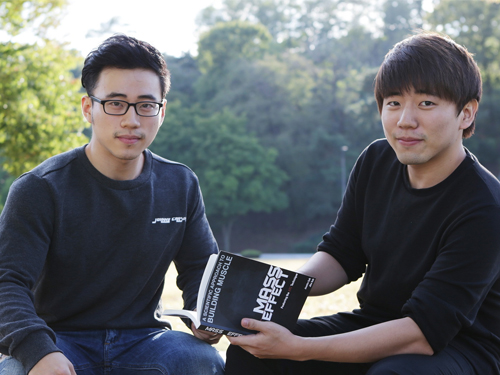 Two Undergraduate KAIST Students Publish a Book on Health Management
Joonho Suh of the Aerospace Engineering Department and Jiho Suh of the Mechanical Engineering Department are both brothers and undergraduates at KAIST.
The Suh brothers, who are three years apart, have recently published a self-help book in English on staying healthy entitled “A Scientific Approach to Building Muscle: Mass Effect.”
The book introduces techniques to build muscles, adapting them from an engineering concept called "Active Torque Control (ACT)," the management of turning forces imposed on a vehicle. Just as ACT influences the performance of a vehicle, good exercise involves the right degree of body angles and the right direction of body movements to keep the best posture necessary for burning calories and strengthening muscles.
In the book, they also suggest healthy diet plans based on scientific knowledge and data that the writers borrowed from such fields as anatomy, physiology, and motor mechanics to maintain a healthy weight.
Joonho Suh said,
“If we understand the mechanism of how our body works, the chances are high we will have good muscle tone and a balanced diet. We used a great deal of scientific knowledge and turned it into a health management program that can be customized per individual needs.”
The younger brother, Jiho, added,
“In fact, we applied our methods in the book to beginners who took weight training and fitness for one hour a day for one month, we learned that their muscle mass increased by 1-1.5 kg while losing body fat by 2-3 kg.”
The brothers said they planned to publish a Korean language version of the book next year.
The authors of "Mass Effect": Joonho Suh (left) and Jiho Suh (right)
2015.10.26 View 7674
Two Undergraduate KAIST Students Publish a Book on Health Management
Joonho Suh of the Aerospace Engineering Department and Jiho Suh of the Mechanical Engineering Department are both brothers and undergraduates at KAIST.
The Suh brothers, who are three years apart, have recently published a self-help book in English on staying healthy entitled “A Scientific Approach to Building Muscle: Mass Effect.”
The book introduces techniques to build muscles, adapting them from an engineering concept called "Active Torque Control (ACT)," the management of turning forces imposed on a vehicle. Just as ACT influences the performance of a vehicle, good exercise involves the right degree of body angles and the right direction of body movements to keep the best posture necessary for burning calories and strengthening muscles.
In the book, they also suggest healthy diet plans based on scientific knowledge and data that the writers borrowed from such fields as anatomy, physiology, and motor mechanics to maintain a healthy weight.
Joonho Suh said,
“If we understand the mechanism of how our body works, the chances are high we will have good muscle tone and a balanced diet. We used a great deal of scientific knowledge and turned it into a health management program that can be customized per individual needs.”
The younger brother, Jiho, added,
“In fact, we applied our methods in the book to beginners who took weight training and fitness for one hour a day for one month, we learned that their muscle mass increased by 1-1.5 kg while losing body fat by 2-3 kg.”
The brothers said they planned to publish a Korean language version of the book next year.
The authors of "Mass Effect": Joonho Suh (left) and Jiho Suh (right)
2015.10.26 View 7674 -
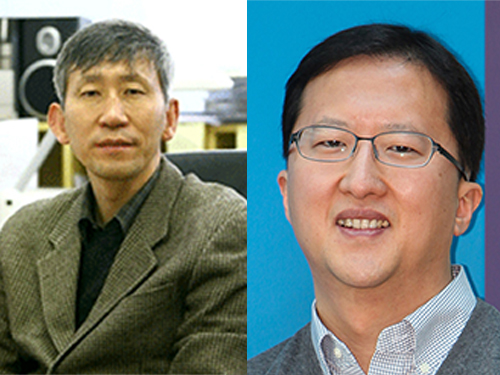 Professors Sukbok Chang and Jang-Wook Choi Receive the 2015 Knowledge Award from the Korean Government
The Ministry of Science, ICT and Future Planning (MISP) of the Republic of Korea announced the 2015 Knowledge Awards on October 20, 2015. Two KAIST professors received the award.
Established in 2009, the awards are presented to Korean scientists whose publications have contributed to the international science community. Specifically, the MISP used the two biggest science databases, Science Citation Index Expanded (SCIE) and Scopus, to identify ten highly cited papers ranked in the top 1% by total citations in the past ten years.
Professor Sukbok Chang of Chemistry (left in the picture below) is a global authority in the field of catalytic hydrocarbon functionalization. His paper entitled “Palladium-catalyzed C-H Functionalization of Pyridine N-Oxides: Highly Selective Alkenylation and Direct Arylation with Unactivated Arenes,” which was published in the Journal of the American Chemical Society in 2008, was once selected by Thomson Reuters as one of the “Most Influential Research Papers of the Month.” In 2011, the American Chemical Society included his paper in the list of the top 20 research papers that were most frequently cited in the last three years.
Professor Jang-Wook Choi of the Graduate School of EEWS (Energy, Environment, Water, and Sustainability) has been known for his leading research in rechargeable battery, supercapacitor, and materials chemistry. In particular, his work on secondary fuel cells attracted significant attention from academia and industry in Korea. Professor Choi developed a super-thin flexible lithium-ion battery this year, thinner than a credit card, which lasts longer than the existing batteries and with greater performance. He also developed new electrode materials for next-generation sodium-ion and magnesium secondary fuel cells.
Professor Sukbok Chang (left) and Professor Jang-Wook Choi (right)
2015.10.23 View 12100
Professors Sukbok Chang and Jang-Wook Choi Receive the 2015 Knowledge Award from the Korean Government
The Ministry of Science, ICT and Future Planning (MISP) of the Republic of Korea announced the 2015 Knowledge Awards on October 20, 2015. Two KAIST professors received the award.
Established in 2009, the awards are presented to Korean scientists whose publications have contributed to the international science community. Specifically, the MISP used the two biggest science databases, Science Citation Index Expanded (SCIE) and Scopus, to identify ten highly cited papers ranked in the top 1% by total citations in the past ten years.
Professor Sukbok Chang of Chemistry (left in the picture below) is a global authority in the field of catalytic hydrocarbon functionalization. His paper entitled “Palladium-catalyzed C-H Functionalization of Pyridine N-Oxides: Highly Selective Alkenylation and Direct Arylation with Unactivated Arenes,” which was published in the Journal of the American Chemical Society in 2008, was once selected by Thomson Reuters as one of the “Most Influential Research Papers of the Month.” In 2011, the American Chemical Society included his paper in the list of the top 20 research papers that were most frequently cited in the last three years.
Professor Jang-Wook Choi of the Graduate School of EEWS (Energy, Environment, Water, and Sustainability) has been known for his leading research in rechargeable battery, supercapacitor, and materials chemistry. In particular, his work on secondary fuel cells attracted significant attention from academia and industry in Korea. Professor Choi developed a super-thin flexible lithium-ion battery this year, thinner than a credit card, which lasts longer than the existing batteries and with greater performance. He also developed new electrode materials for next-generation sodium-ion and magnesium secondary fuel cells.
Professor Sukbok Chang (left) and Professor Jang-Wook Choi (right)
2015.10.23 View 12100 -
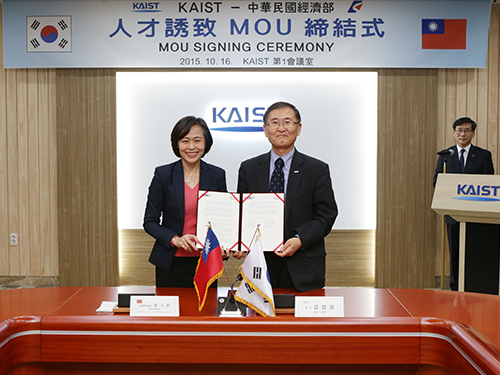 KAIST Agrees to Personnel Exchange with the Ministry of Economic Affairs of the Republic of China
A delegation from the Ministry of Economic Affairs (MOEA) of the Republic of China (ROC) visited KAIST on October 16, 2015.
President Steve Kang of KAIST and Director General Yu-Ping Lien of the Department of Investment Services, MOEA, signed a memorandum of understanding (MOU) on exchanging personnel, recruiting and attracting top talents, and sharing job information.
With the MOU, KAIST and MOEA will develop a mobility program for students in Korea and ROC to help them seek employment opportunities in both nations. Director General Lien hoped that the MOU would bring more of KAIST students in the information technology field to work in ROC.
President Kang responded,
“KAIST has fostered highly talented engineers and researchers across all fields of science and engineering. If these students can have a place in ROC to realize their potential, this certainly could benefit the two nations.”
In the picture from left to right is Director General Yu-Ping Lien of the Department of Investment Services, the Ministry of Economic Affairs of the Republic of China and President Steve Kang of KAIST.
2015.10.17 View 5521
KAIST Agrees to Personnel Exchange with the Ministry of Economic Affairs of the Republic of China
A delegation from the Ministry of Economic Affairs (MOEA) of the Republic of China (ROC) visited KAIST on October 16, 2015.
President Steve Kang of KAIST and Director General Yu-Ping Lien of the Department of Investment Services, MOEA, signed a memorandum of understanding (MOU) on exchanging personnel, recruiting and attracting top talents, and sharing job information.
With the MOU, KAIST and MOEA will develop a mobility program for students in Korea and ROC to help them seek employment opportunities in both nations. Director General Lien hoped that the MOU would bring more of KAIST students in the information technology field to work in ROC.
President Kang responded,
“KAIST has fostered highly talented engineers and researchers across all fields of science and engineering. If these students can have a place in ROC to realize their potential, this certainly could benefit the two nations.”
In the picture from left to right is Director General Yu-Ping Lien of the Department of Investment Services, the Ministry of Economic Affairs of the Republic of China and President Steve Kang of KAIST.
2015.10.17 View 5521 -
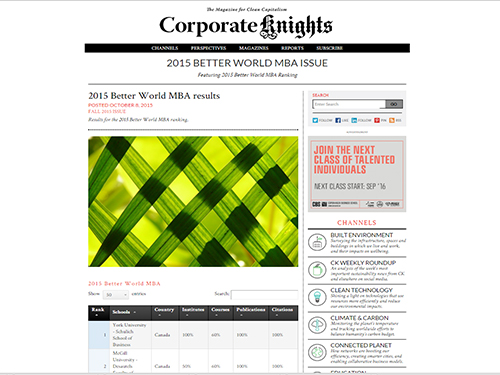 KAIST's College of Business Places Fourth in the 2015 Better World MBA Ranking
The Corporate Knights, a business and society magazine based in Canada, released the results of the 2015 Better World MBA Ranking on October 8, 2015.
KAIST’s business school ranked fourth globally and, number one in Asia, according to the list.
The 2015 Corporate Knights Better World MBA Ranking included a total of 121 schools; York University’s Schulich School of Business of Canada took first place.
The rankings were based on three criteria: the number of curricula (core and required courses) dedicated to sustainability, the number of research institutions and centers at the business school, and the volume of faculty research focused on better world topics such as sustainable finance, clean energy, or gender diversity.
The Better World MBA Ranking aims to identify business schools that best equip graduates who seek to change the world for the better by offering students opportunities to learn how to integrate social and environmental factors in their understanding of management functions via core MBA courses, faculty expertise, and research centers.
Dean Dong-Seok Kim of the College of Business at KAIST said,
“For years, our school has introduced a wide range of programs and research initiatives that address important social needs and issues. As part of this effort, we created the Graduate School of Green Growth and MBA for Social Entrepreneurship back in 2013. I believe that these endeavors played a favorable role in our receiving high scores in the ranking.”
KAIST’s Graduate School of Green Growth previously ranked sixth in the world’s top Green MBA School list published by Corporate Knights.
For the 2015 Better World MBA Ranking, go to
http://www.corporateknights.com/reports/2015-global-sustainable-mba/11153-14442629/.
2015.10.12 View 5463
KAIST's College of Business Places Fourth in the 2015 Better World MBA Ranking
The Corporate Knights, a business and society magazine based in Canada, released the results of the 2015 Better World MBA Ranking on October 8, 2015.
KAIST’s business school ranked fourth globally and, number one in Asia, according to the list.
The 2015 Corporate Knights Better World MBA Ranking included a total of 121 schools; York University’s Schulich School of Business of Canada took first place.
The rankings were based on three criteria: the number of curricula (core and required courses) dedicated to sustainability, the number of research institutions and centers at the business school, and the volume of faculty research focused on better world topics such as sustainable finance, clean energy, or gender diversity.
The Better World MBA Ranking aims to identify business schools that best equip graduates who seek to change the world for the better by offering students opportunities to learn how to integrate social and environmental factors in their understanding of management functions via core MBA courses, faculty expertise, and research centers.
Dean Dong-Seok Kim of the College of Business at KAIST said,
“For years, our school has introduced a wide range of programs and research initiatives that address important social needs and issues. As part of this effort, we created the Graduate School of Green Growth and MBA for Social Entrepreneurship back in 2013. I believe that these endeavors played a favorable role in our receiving high scores in the ranking.”
KAIST’s Graduate School of Green Growth previously ranked sixth in the world’s top Green MBA School list published by Corporate Knights.
For the 2015 Better World MBA Ranking, go to
http://www.corporateknights.com/reports/2015-global-sustainable-mba/11153-14442629/.
2015.10.12 View 5463 -
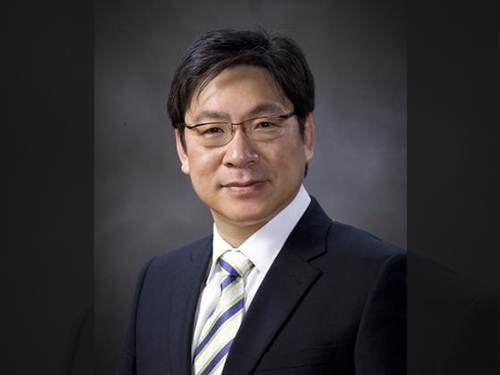 Professor Key-Sun Choi Receives the Order of Service Merit Green Stripes from the Korean Government
The award recognizes Professor Choi’s life-long research effort to make Korean language digitally available, both nationally and internationally.
Professor Key-Sun Choi of the School of Computing at KAIST received the Order of Service Merit Green Stripes from the Korean government at the 569th Korean Language Day, held annually to commemorate the invention of the Korean language, Hangeul. The ceremony took place on October 9, 2015, at the Sejong Center in Seoul.
Professor Choi has distinguished himself in the field of natural language processing (NLP), including Korean language. He developed a Korean NLP parser that enabled information processing and data analysis of Korean language, as well as a digital Korean dictionary, contributing to the advancement of Korean language-based information technology.
Professor Choi also led the way to widespread use of Korean natural language in computing by developing and commercializing open source software to process the Korean language.
He has served leading roles in many of the international academic societies and standardization organizations, among others, as the vice president of Infoterm (the International Information Center for Terminology), president of the Asia Federation of Natural Language Processing, vice chair of ISO/TC 37, a technical committee in the International Organization for Standardization (ISO), and a council member for the International Association of Machine Translation.
2015.10.08 View 8947
Professor Key-Sun Choi Receives the Order of Service Merit Green Stripes from the Korean Government
The award recognizes Professor Choi’s life-long research effort to make Korean language digitally available, both nationally and internationally.
Professor Key-Sun Choi of the School of Computing at KAIST received the Order of Service Merit Green Stripes from the Korean government at the 569th Korean Language Day, held annually to commemorate the invention of the Korean language, Hangeul. The ceremony took place on October 9, 2015, at the Sejong Center in Seoul.
Professor Choi has distinguished himself in the field of natural language processing (NLP), including Korean language. He developed a Korean NLP parser that enabled information processing and data analysis of Korean language, as well as a digital Korean dictionary, contributing to the advancement of Korean language-based information technology.
Professor Choi also led the way to widespread use of Korean natural language in computing by developing and commercializing open source software to process the Korean language.
He has served leading roles in many of the international academic societies and standardization organizations, among others, as the vice president of Infoterm (the International Information Center for Terminology), president of the Asia Federation of Natural Language Processing, vice chair of ISO/TC 37, a technical committee in the International Organization for Standardization (ISO), and a council member for the International Association of Machine Translation.
2015.10.08 View 8947 -
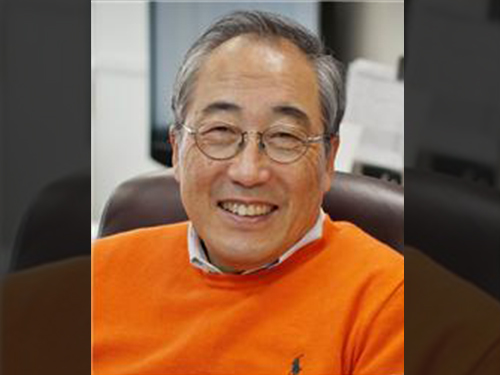 Yang-Hann Kim named recipient of the Rossing Prize in Acoustics Education by the Acoustical Society of America
Courtesy of the Acoustical Society of America (ASA)
Press release issued by ASA on October 8, 2015:
Yang-Hann Kim named recipient of the Rossing Prize in Acoustics Education by the Acoustical Society of America
Melville (NY), 8 October 2015—Yang-Hann Kim, Professor at KAIST (Korea Advanced Institute of Science and Technology), Daejeon, has been named recipient of the Acoustical Society of America (ASA) Rossing Prize in Acoustics Education. The Rossing Prize is awarded to an individual who has made significant contributions toward furthering acoustics education through distinguished teaching, creation of educational materials, textbook writing and other activities. The Prize will be presented at the 170th meeting of the ASA on 4 November 2015 in Jacksonville, Florida.
“It is my great honor to receive the Rossing Prize, which has been given to outstanding scholar members of ASA since 2003. I never dreamed to be one of them.” said Kim. “I must express my deep respect and love to my friend Thomas Rossing: I have known him more than 20 years, always respect what he has done for teaching, writing books, and pioneering work in musical acoustics.”
Yang-Hann Kim is a Fellow of the Acoustical Society of America. He received a Ph.D. from the Massachusetts Institute of Technology. His main research interests in acoustics began with “sound visualization” resulted in the development of the “sound camera” which makes any sound visible instantly. Then he moved to “sound manipulation.” Using his manipulation technology, one can move any sound in space and time, positioning sound, and can create a private sound zone. Sound Visualization and Manipulation, (Wiley, 2013), summarizes these two fields. Dr. Kim’s textbook, Sound Propagation: An Impedance Based Approach (John Wiley and Sons, 2010), is well acknowledged by the associated professional communities as one of best acoustics textbooks. Using his teaching experience at KAIST, he created a YouTube lecture on acoustics and vibration which is also available in MOOC (Massive Open Online Course). He has also presented lectures to over 500 engineers and technicians for the past 30 years.
###
The Acoustical Society of America (ASA) is the premier international scientific society in acoustics devoted to the science and technology of sound. Its 7000 members worldwide represent a broad spectrum of the study of acoustics. ASA publications include the Journal of the Acoustical Society of America—the world’s leading journal on acoustics, Acoustics Today magazine, books, and standards on acoustics. The Society also holds two major scientific meetings per year. For more information about the Society visit our website, www.acousticalsociety.org.
2015.10.06 View 9643
Yang-Hann Kim named recipient of the Rossing Prize in Acoustics Education by the Acoustical Society of America
Courtesy of the Acoustical Society of America (ASA)
Press release issued by ASA on October 8, 2015:
Yang-Hann Kim named recipient of the Rossing Prize in Acoustics Education by the Acoustical Society of America
Melville (NY), 8 October 2015—Yang-Hann Kim, Professor at KAIST (Korea Advanced Institute of Science and Technology), Daejeon, has been named recipient of the Acoustical Society of America (ASA) Rossing Prize in Acoustics Education. The Rossing Prize is awarded to an individual who has made significant contributions toward furthering acoustics education through distinguished teaching, creation of educational materials, textbook writing and other activities. The Prize will be presented at the 170th meeting of the ASA on 4 November 2015 in Jacksonville, Florida.
“It is my great honor to receive the Rossing Prize, which has been given to outstanding scholar members of ASA since 2003. I never dreamed to be one of them.” said Kim. “I must express my deep respect and love to my friend Thomas Rossing: I have known him more than 20 years, always respect what he has done for teaching, writing books, and pioneering work in musical acoustics.”
Yang-Hann Kim is a Fellow of the Acoustical Society of America. He received a Ph.D. from the Massachusetts Institute of Technology. His main research interests in acoustics began with “sound visualization” resulted in the development of the “sound camera” which makes any sound visible instantly. Then he moved to “sound manipulation.” Using his manipulation technology, one can move any sound in space and time, positioning sound, and can create a private sound zone. Sound Visualization and Manipulation, (Wiley, 2013), summarizes these two fields. Dr. Kim’s textbook, Sound Propagation: An Impedance Based Approach (John Wiley and Sons, 2010), is well acknowledged by the associated professional communities as one of best acoustics textbooks. Using his teaching experience at KAIST, he created a YouTube lecture on acoustics and vibration which is also available in MOOC (Massive Open Online Course). He has also presented lectures to over 500 engineers and technicians for the past 30 years.
###
The Acoustical Society of America (ASA) is the premier international scientific society in acoustics devoted to the science and technology of sound. Its 7000 members worldwide represent a broad spectrum of the study of acoustics. ASA publications include the Journal of the Acoustical Society of America—the world’s leading journal on acoustics, Acoustics Today magazine, books, and standards on acoustics. The Society also holds two major scientific meetings per year. For more information about the Society visit our website, www.acousticalsociety.org.
2015.10.06 View 9643 -
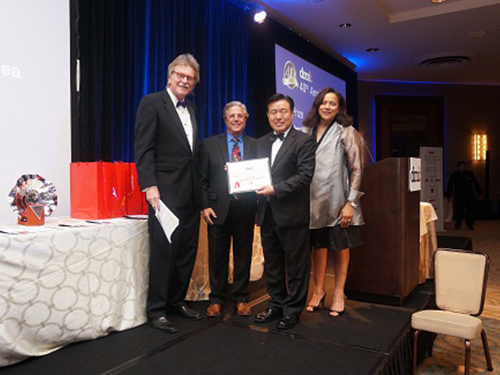 Professor Kyung-Won Chung Receives the 2015 Design Value Awards
The Design Management Institute (DMI) announced eleven winners of its 2015 Design Value Awards.
Professor Kyung-Won Chung of the Industrial Design Department at KAIST took one of the four First Place Design Value Awards. The award ceremony was held on September 28, 2015, at the Royal Sonesta Hotel in Boston.
DMI is an international organization that has actively advocated for the strategic value of design, sponsoring research, publishing academic papers, connecting members across disciplines and the globe, and sharing best design practices.
Commemorating its 40th anniversary, DMI created the inaugural Design Value Awards this year, which honors the contributions of design teams who have delivered significant value through design or design management practices.
There were four categories of the awards: first, second, and third prize, and Honorable Mention. The first place had four winners; both the second and third took two winners each. The honorable mention included three awardees.
The award noted Professor Chung's contributions to the development of design management theory and practices in Korea and his dedication to elevate KAIST’s industrial design department to one of the 30 leading design institutions in the world during his 30-year career at the university.
DMI also appointed Professor Chung a Life Fellow.
Professor Chung said,
“I am greatly honored to receive such a significant award, the equivalent of the Academy Awards in the field of design. I hope this award will encourage the further development of the Korean design industry to lead the global design community.”
He has served in various important positions in public and private organizations, including as the president of the Korea Institute of Design Promotion, Vice Mayor of Design for the City of Seoul, Advisor to the Design Division of Samsung Electronics, and a member of organizing committee of the International Council of Societies of Industrial Design.
2015.10.04 View 7380
Professor Kyung-Won Chung Receives the 2015 Design Value Awards
The Design Management Institute (DMI) announced eleven winners of its 2015 Design Value Awards.
Professor Kyung-Won Chung of the Industrial Design Department at KAIST took one of the four First Place Design Value Awards. The award ceremony was held on September 28, 2015, at the Royal Sonesta Hotel in Boston.
DMI is an international organization that has actively advocated for the strategic value of design, sponsoring research, publishing academic papers, connecting members across disciplines and the globe, and sharing best design practices.
Commemorating its 40th anniversary, DMI created the inaugural Design Value Awards this year, which honors the contributions of design teams who have delivered significant value through design or design management practices.
There were four categories of the awards: first, second, and third prize, and Honorable Mention. The first place had four winners; both the second and third took two winners each. The honorable mention included three awardees.
The award noted Professor Chung's contributions to the development of design management theory and practices in Korea and his dedication to elevate KAIST’s industrial design department to one of the 30 leading design institutions in the world during his 30-year career at the university.
DMI also appointed Professor Chung a Life Fellow.
Professor Chung said,
“I am greatly honored to receive such a significant award, the equivalent of the Academy Awards in the field of design. I hope this award will encourage the further development of the Korean design industry to lead the global design community.”
He has served in various important positions in public and private organizations, including as the president of the Korea Institute of Design Promotion, Vice Mayor of Design for the City of Seoul, Advisor to the Design Division of Samsung Electronics, and a member of organizing committee of the International Council of Societies of Industrial Design.
2015.10.04 View 7380 -
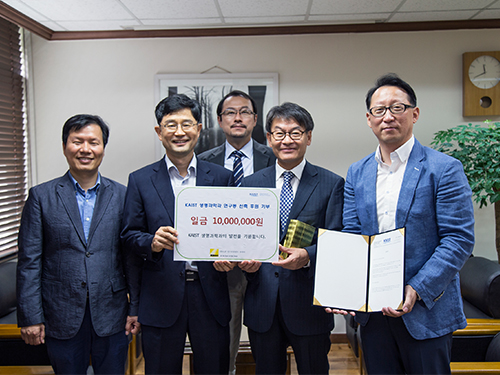 Nikon Instruments Korea Donates a Fund to KAIST's Department of Biological Sciences
Representatives from Nikon Instruments Korea Co., Ltd., a producer of microscopes and measuring instruments, visited the KAIST campus on September 25, 2015, and donated USD 9,000 to the Department of Biological Sciences at KAIST.
A small ceremony to mark the donation took place at the department’s conference room.
In the picture from left to right were Professor Won-Do Heo, Department Head Byung-Ha Oh, Professor Sangyong Jon, President Sam-Sup Jang of Korea Instech, and Director Ik-Soo Yoo of Nikon Instruments Korea.
The department announced that the fund would be used to build its new research center to house the state-of-the-art research equipment and tools for the development of new medicine.
2015.10.03 View 5328
Nikon Instruments Korea Donates a Fund to KAIST's Department of Biological Sciences
Representatives from Nikon Instruments Korea Co., Ltd., a producer of microscopes and measuring instruments, visited the KAIST campus on September 25, 2015, and donated USD 9,000 to the Department of Biological Sciences at KAIST.
A small ceremony to mark the donation took place at the department’s conference room.
In the picture from left to right were Professor Won-Do Heo, Department Head Byung-Ha Oh, Professor Sangyong Jon, President Sam-Sup Jang of Korea Instech, and Director Ik-Soo Yoo of Nikon Instruments Korea.
The department announced that the fund would be used to build its new research center to house the state-of-the-art research equipment and tools for the development of new medicine.
2015.10.03 View 5328 -
 Professor Sang-Min Bae receives the 2015 IDEA Awards
Professor Sang-min Bae of the Industrial Design Department at KAIST garnered one silver and two bronze awards from the 2015 International Design Excellence Awards (IDEA). Along with iF Design Award and Red Dot Design Awards, the IDEA is regarded as one of the world’s most respected recognition in the field of design.
Trash to Bin (T2B), a silver winner in the category of Social Impact Design, is a trash bin made of 1.87 lb (0.85 kg) of discarded papers. Using one-hundred percent recycled paper pulp, each T2B costs under $5 for production. The bin can be fully waterproofed for at least six hours. While satisfying with the industry safety standards, this environmentally-friendly bin can be produced on a large scale using litter energy, but offering the exact same benefit of a general garbage can.
Roll-Di, one of the two bronze winners, is a direction indicator that tells which string of screen curtains should be pulled to make the curtain go up or down. As shown in the picture below, Roll-Di can be installed at the bottom of the string, and the “up and down” arrows show which side of the string needs to be pulled to achieve the desired position of the curtain. This simple, yet handy solution to the problem that people frequently make the mistake of pulling the wrong string provides users with greater convenience.
The other bronze winner is Printing Solar-cell, an organic cartridge module that prints solar-cells using a domestic, ink-jet printer. With Printing Solar-cell, users can design their own cell patterns and charge their electronics anywhere holding the printed solar-cell on a copy paper.
Professor Bae said, “I’ve always tried to design something that is useful for people in need. I consider the IDEA awards an encouragement to keep up with my work toward that goal.”
Trash to Bin
Roll-Di
Printing Solar-cell
2015.09.30 View 8289
Professor Sang-Min Bae receives the 2015 IDEA Awards
Professor Sang-min Bae of the Industrial Design Department at KAIST garnered one silver and two bronze awards from the 2015 International Design Excellence Awards (IDEA). Along with iF Design Award and Red Dot Design Awards, the IDEA is regarded as one of the world’s most respected recognition in the field of design.
Trash to Bin (T2B), a silver winner in the category of Social Impact Design, is a trash bin made of 1.87 lb (0.85 kg) of discarded papers. Using one-hundred percent recycled paper pulp, each T2B costs under $5 for production. The bin can be fully waterproofed for at least six hours. While satisfying with the industry safety standards, this environmentally-friendly bin can be produced on a large scale using litter energy, but offering the exact same benefit of a general garbage can.
Roll-Di, one of the two bronze winners, is a direction indicator that tells which string of screen curtains should be pulled to make the curtain go up or down. As shown in the picture below, Roll-Di can be installed at the bottom of the string, and the “up and down” arrows show which side of the string needs to be pulled to achieve the desired position of the curtain. This simple, yet handy solution to the problem that people frequently make the mistake of pulling the wrong string provides users with greater convenience.
The other bronze winner is Printing Solar-cell, an organic cartridge module that prints solar-cells using a domestic, ink-jet printer. With Printing Solar-cell, users can design their own cell patterns and charge their electronics anywhere holding the printed solar-cell on a copy paper.
Professor Bae said, “I’ve always tried to design something that is useful for people in need. I consider the IDEA awards an encouragement to keep up with my work toward that goal.”
Trash to Bin
Roll-Di
Printing Solar-cell
2015.09.30 View 8289 -
 KAIST and Oberthur Technologies Agree for Research and Development in Mobile Security
Professor Kwangjo Kim of the School of Computing at KAIST has signed a research and development (R&D) agreement with Marc Bertin, the Chief Technology Officer of Oberthur Technologies (OT), a French security solutions firm, on September 18, 2015 in Paris.
Under the agreement, KAIST and OT will conduct joint research on mobile security as well as implement an internship program for KAIST graduate students to work either at OT’s R&D center in Korea or in France.
OT has established a research center in Korea in July 2014, which was the fourth of its research centers in Asia.
Professor Kim said, “Our goal at KAIST is to cultivate top-level security experts in security technologies. By partnering with such a leader in security technologies as OT, we know that we will both help shape tomorrow’s security solution for the IoT (Internet of Things) space.”
In the picture, Professor Kwangjo Kim (left) shakes hands with Marc Bertin, the Chief Technology Officer of Oberthur Technologies (right), after the signing of a memorandum of understanding.
2015.09.24 View 7739
KAIST and Oberthur Technologies Agree for Research and Development in Mobile Security
Professor Kwangjo Kim of the School of Computing at KAIST has signed a research and development (R&D) agreement with Marc Bertin, the Chief Technology Officer of Oberthur Technologies (OT), a French security solutions firm, on September 18, 2015 in Paris.
Under the agreement, KAIST and OT will conduct joint research on mobile security as well as implement an internship program for KAIST graduate students to work either at OT’s R&D center in Korea or in France.
OT has established a research center in Korea in July 2014, which was the fourth of its research centers in Asia.
Professor Kim said, “Our goal at KAIST is to cultivate top-level security experts in security technologies. By partnering with such a leader in security technologies as OT, we know that we will both help shape tomorrow’s security solution for the IoT (Internet of Things) space.”
In the picture, Professor Kwangjo Kim (left) shakes hands with Marc Bertin, the Chief Technology Officer of Oberthur Technologies (right), after the signing of a memorandum of understanding.
2015.09.24 View 7739 -
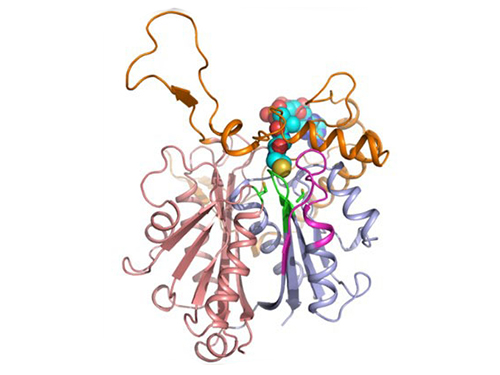 Discovery of Redox-Switch of KEenzyme Involved in N-Butanol Biosynthesis
Research teams at KAIST and Kyungpook National University (KNU) have succeeded in uncovering the redox-switch of thiolase, a key enzyme for n-butanol production in Clostridium acetobutylicum, one of the best known butanol-producing bacteria.
Biological n-butanol production was first reported by Louis Pasteur in 1861, and the bioprocess was industrialized usingClostridium acetobutylicum. The fermentation process by Clostridium strains has been known to be the most efficient one for n-butanol production. Due to growing world-wide issues such as energy security and climate change, the biological production of n-butanol has been receiving much renewed interest. This is because n-butanol possesses much better fuel characteristics compared to ethanol, such as higher energy content (29.2 MJ/L vs 19.6 MJ/L), less corrosiveness, less hygroscopy, and the ease with which it can be blended with gasoline and diesel.
In the paper published in Nature Communications, a broad-scope, online-only, and open access journal issued by the Nature Publishing Group (NPG), on September 22, 2015, Professor Kyung-Jin Kim at the School of Life Sciences, KNU, and Distinguished Professor Sang Yup Lee at the Department of Chemical and Biomolecular Engineering, KAIST, have proved that the redox-switch of thiolase plays a role in a regulation of metabolic flux in C. acetobutylicum by using in silico modeling and simulation tools.
The research team has redesigned thiolase with enhanced activity on the basis of the 3D structure of the wild-type enzyme. To reinforce a metabolic flux toward butanol production, the metabolic network of C. acetobutylicum strain was engineered with the redesigned enzyme. The combination of the discovery of 3D enzyme structure and systems metabolic engineering approaches resulted in increased n-butanol production in C. acetobutylicum, which allows the production of this important industrial chemical to be cost competitive.
Professors Kim and Lee said, "We have reported the 3D structure of C. acetobutylicum thiolase-a key enzyme involved in n-butanol biosynthesis, for the first time. Further study will be done to produce butanol more economically on the basis of the 3D structure of C. acetobutylicum thiolase."
This work was published online in Nature Communications on September 22, 2015.
Reference: Kim et al. "Redox-switch regulatory mechanism of thiolase from Clostridium acetobutylicum," Nature Communications
This research was supported by the Technology Development Program to Solve Climate Changes from the Ministry of Education, Science and Technology (MEST), Korea, the National Research Foundation of Korea, and the Advanced Biomass Center through the Global Frontier Research Program of the MEST, Korea.
For further information, contact Dr. Sang Yup Lee, Distinguished Professor, KAIST, Daejeon, Korea (leesy@kaist.ac.kr, +82-42-350-3930); and Dr. Kyung-Jin Kim, Professor, KNU, Daegu, Korea (kkim@knu.ac.kr, +82-53-950-6088).
Figure 1: A redox-switch of thiolase involves in butanol biosynthesis in Clostridium acetobutylicum. Thiolase condenses two acetyl-CoA molecules for initiating four carbon flux towards butanol.
Figure 2: Thiolase catalyzes the condensation reaction of acetyl-CoA to acetoacetyl-CoA. Two catalytic cysteine residues at 88th and 378th are oxidized and formed an intermolecular disulfide bond in an oxidized status, which results in inactivation of the enzyme for n-butanol biosynthesis. The intermolecular disulfide bond is broken enabling the n-butanol biosynthesis, when the environment status is reduced.
2015.09.23 View 10887
Discovery of Redox-Switch of KEenzyme Involved in N-Butanol Biosynthesis
Research teams at KAIST and Kyungpook National University (KNU) have succeeded in uncovering the redox-switch of thiolase, a key enzyme for n-butanol production in Clostridium acetobutylicum, one of the best known butanol-producing bacteria.
Biological n-butanol production was first reported by Louis Pasteur in 1861, and the bioprocess was industrialized usingClostridium acetobutylicum. The fermentation process by Clostridium strains has been known to be the most efficient one for n-butanol production. Due to growing world-wide issues such as energy security and climate change, the biological production of n-butanol has been receiving much renewed interest. This is because n-butanol possesses much better fuel characteristics compared to ethanol, such as higher energy content (29.2 MJ/L vs 19.6 MJ/L), less corrosiveness, less hygroscopy, and the ease with which it can be blended with gasoline and diesel.
In the paper published in Nature Communications, a broad-scope, online-only, and open access journal issued by the Nature Publishing Group (NPG), on September 22, 2015, Professor Kyung-Jin Kim at the School of Life Sciences, KNU, and Distinguished Professor Sang Yup Lee at the Department of Chemical and Biomolecular Engineering, KAIST, have proved that the redox-switch of thiolase plays a role in a regulation of metabolic flux in C. acetobutylicum by using in silico modeling and simulation tools.
The research team has redesigned thiolase with enhanced activity on the basis of the 3D structure of the wild-type enzyme. To reinforce a metabolic flux toward butanol production, the metabolic network of C. acetobutylicum strain was engineered with the redesigned enzyme. The combination of the discovery of 3D enzyme structure and systems metabolic engineering approaches resulted in increased n-butanol production in C. acetobutylicum, which allows the production of this important industrial chemical to be cost competitive.
Professors Kim and Lee said, "We have reported the 3D structure of C. acetobutylicum thiolase-a key enzyme involved in n-butanol biosynthesis, for the first time. Further study will be done to produce butanol more economically on the basis of the 3D structure of C. acetobutylicum thiolase."
This work was published online in Nature Communications on September 22, 2015.
Reference: Kim et al. "Redox-switch regulatory mechanism of thiolase from Clostridium acetobutylicum," Nature Communications
This research was supported by the Technology Development Program to Solve Climate Changes from the Ministry of Education, Science and Technology (MEST), Korea, the National Research Foundation of Korea, and the Advanced Biomass Center through the Global Frontier Research Program of the MEST, Korea.
For further information, contact Dr. Sang Yup Lee, Distinguished Professor, KAIST, Daejeon, Korea (leesy@kaist.ac.kr, +82-42-350-3930); and Dr. Kyung-Jin Kim, Professor, KNU, Daegu, Korea (kkim@knu.ac.kr, +82-53-950-6088).
Figure 1: A redox-switch of thiolase involves in butanol biosynthesis in Clostridium acetobutylicum. Thiolase condenses two acetyl-CoA molecules for initiating four carbon flux towards butanol.
Figure 2: Thiolase catalyzes the condensation reaction of acetyl-CoA to acetoacetyl-CoA. Two catalytic cysteine residues at 88th and 378th are oxidized and formed an intermolecular disulfide bond in an oxidized status, which results in inactivation of the enzyme for n-butanol biosynthesis. The intermolecular disulfide bond is broken enabling the n-butanol biosynthesis, when the environment status is reduced.
2015.09.23 View 10887